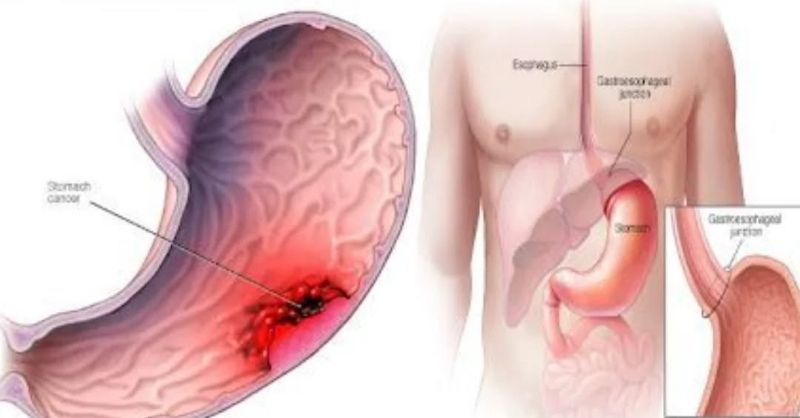3. Feeling Full Too Soon
You start a meal feeling hungry but stop after just a few bites — not because you’re satisfied, but because your stomach says “no more.”
This sensation, called early satiety, can develop when something inside the stomach restricts its normal function. Over time, this may lead to fatigue, malnutrition, or more severe complications.
4. Signs of Bleeding in the Digestive Tract
Blood isn’t always visible, but your body often gives other hints. Black, tarry stools or vomit that resembles coffee grounds are red flags that shouldn’t be ignored.
Other possible clues:
- Unusual fatigue or dizziness
- Pale skin or shortness of breath
- Vomiting blood or passing dark stools
Even slow, internal bleeding can have a serious impact over time — and it’s one of the most urgent symptoms to get checked out quickly.
5. Recurring Nausea or Unexplained Vomiting

You’re not sick. You haven’t eaten anything unusual. But your stomach keeps turning — and meals are starting to feel like a chore instead of a pleasure.
If nausea or vomiting happens more than once or twice a week without a clear cause, it’s time to check in with a healthcare provider. It could mean there’s something interfering with digestion from within.
6. Constant Fatigue That Doesn’t Improve

Not just “I stayed up too late” tired — but the kind of fatigue that makes it hard to think clearly, climb stairs, or stay awake after meals.
This level of exhaustion may be caused by hidden blood loss, inflammation, or poor nutrient absorption — all of which can be connected to advanced stomach issues.
7. When to Speak with a Doctor
While these signs don’t automatically mean cancer, any symptom that lasts more than two weeks or keeps getting worse deserves attention. If something feels off, trust your instincts.
- Over-the-counter remedies stop working
- Symptoms disrupt daily activities
- You feel like your body is “not quite right”
Caring for Your Digestive Health
While no diet can prevent every illness, lifestyle choices matter. To support your stomach and reduce risk:
- Eat a variety of fruits, vegetables, and fiber-rich foods
- Limit processed meats and salty foods
- Avoid smoking and excessive alcohol
- Ask your doctor about screening if you’re at higher risk (family history, H. pylori infection, etc.)
Final Thought
Early symptoms are easy to dismiss — but your body often whispers before it shouts. Pay attention to subtle changes, stay curious about your health, and don’t be afraid to ask for help. Your well-being is worth that first step
3. Feeling Full Too Soon
You start a meal feeling hungry but stop after just a few bites — not because you’re satisfied, but because your stomach says “no more.”
This sensation, called early satiety, can develop when something inside the stomach restricts its normal function. Over time, this may lead to fatigue, malnutrition, or more severe complications.
4. Signs of Bleeding in the Digestive Tract
Blood isn’t always visible, but your body often gives other hints. Black, tarry stools or vomit that resembles coffee grounds are red flags that shouldn’t be ignored.
Other possible clues:
- Unusual fatigue or dizziness
- Pale skin or shortness of breath
- Vomiting blood or passing dark stools
Even slow, internal bleeding can have a serious impact over time — and it’s one of the most urgent symptoms to get checked out quickly.
5. Recurring Nausea or Unexplained Vomiting

You’re not sick. You haven’t eaten anything unusual. But your stomach keeps turning — and meals are starting to feel like a chore instead of a pleasure.
If nausea or vomiting happens more than once or twice a week without a clear cause, it’s time to check in with a healthcare provider. It could mean there’s something interfering with digestion from within.
6. Constant Fatigue That Doesn’t Improve

Not just “I stayed up too late” tired — but the kind of fatigue that makes it hard to think clearly, climb stairs, or stay awake after meals.
This level of exhaustion may be caused by hidden blood loss, inflammation, or poor nutrient absorption — all of which can be connected to advanced stomach issues.
7. When to Speak with a Doctor
While these signs don’t automatically mean cancer, any symptom that lasts more than two weeks or keeps getting worse deserves attention. If something feels off, trust your instincts.
- Over-the-counter remedies stop working
- Symptoms disrupt daily activities
- You feel like your body is “not quite right”
Caring for Your Digestive Health
While no diet can prevent every illness, lifestyle choices matter. To support your stomach and reduce risk:
- Eat a variety of fruits, vegetables, and fiber-rich foods
- Limit processed meats and salty foods
- Avoid smoking and excessive alcohol
- Ask your doctor about screening if you’re at higher risk (family history, H. pylori infection, etc.)
Final Thought
Early symptoms are easy to dismiss — but your body often whispers before it shouts. Pay attention to subtle changes, stay curious about your health, and don’t be afraid to ask for help. Your well-being is worth that first step

